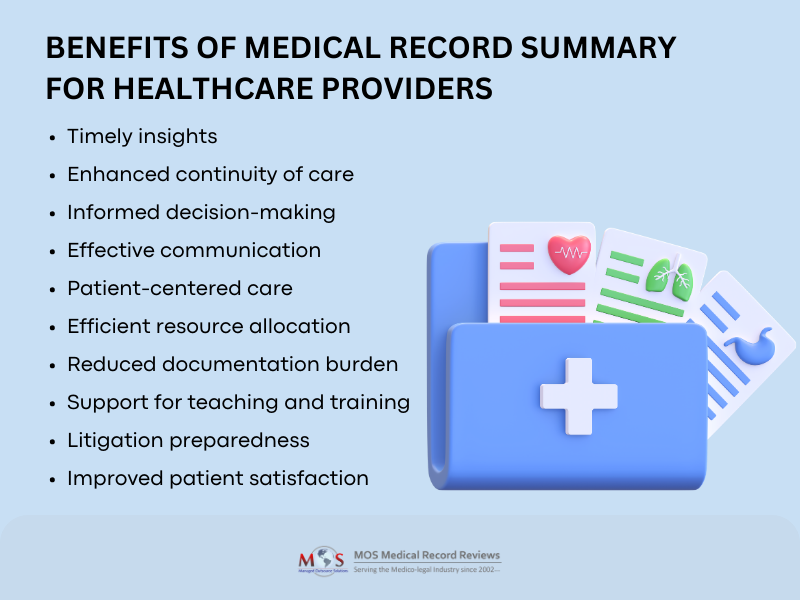In the fast-paced world of healthcare, efficient access to patient information is paramount. Medical records serve as invaluable documents containing comprehensive information about a patient’s medical history, findings, outcomes of diagnostic tests, pre- and post-operative care, medication regimens, and the patient’s overall progression, among other crucial details. Precise and thorough medical records not only provide essential guidance to healthcare providers in treatment accuracy but also function as a safeguard against potential malpractice risks. Medical record organization and summaries serve as critical tools for healthcare providers, as these concise yet comprehensive overviews of patient records help streamline processes, enhance patient care, and optimize decision-making.
Creating medical record summaries involves meticulous examination of pertinent medical records. This procedure entails sorting and dissecting intricate medical information, subsequently converting it into credible medical-legal documentation. In the context of healthcare establishments, copious medical data is documented continuously. Effectively organizing this data to suit the unique needs of healthcare providers-be it hospitals, clinics, imaging centers, or diagnostic labs-is the purpose of medical record summarization services. These services provided by reliable medical review companies provide a structured approach to efficiently handle the substantial influx of patient data.

Why Do Healthcare Providers Need Medical Record Summarization?
- Timely access: Medical record summaries distill voluminous patient records into manageable summaries, providing healthcare providers with quick access to pertinent information.
- Enhanced continuity of care: In a healthcare ecosystem where patients might visit various specialists and facilities, maintaining continuity of care is vital. Summaries ensure that all providers have a comprehensive understanding of the patient’s medical journey, facilitating seamless transitions and preventing critical information from falling through the cracks.
- Informed decision-making: Medical decisions hinge on accurate and up-to-date information. With proper summarization, healthcare providers can make well-informed decisions based on a clear understanding of the patient’s medical background, allergies, medications, and ongoing treatments. This reduces the risk of medical errors and improves patient outcomes.
- Effective communication: Collaboration among healthcare teams is essential for comprehensive patient care. Summaries serve as concise communication tools, enabling seamless exchange of information among various specialists, nurses, and other healthcare professionals involved in the patient’s treatment.
- Patient-centered care: Involving patients in their healthcare journey is increasingly emphasized. The summaries can be shared with patients, empowering them to understand their conditions, treatments, and progress. This fosters patient engagement, encourages questions, and creates a collaborative care environment.
- Efficient resource allocation: By providing a clear snapshot of a patient’s health status, summaries assist healthcare providers in optimizing the allocation of resources, including time, staff, and medical equipment. This contributes to better patient flow and overall operational efficiency.
- Reduced documentation burden: While thorough documentation is crucial, spending excessive time on paperwork can detract from patient care. Summaries strike a balance by presenting the essential information in a concise format, allowing providers to focus more on direct patient interactions.
- Support for teaching and training: Accurate summaries serve as excellent teaching and training aids for medical students, residents, and new healthcare professionals. They offer a structured way to learn about various medical cases without overwhelming novices with extensive records.
- Litigation preparedness: In cases of legal disputes or audits, well-prepared summaries can serve as valuable documentation to support healthcare providers’ decisions and actions, helping to demonstrate the rationale behind medical interventions.
- Improved patient satisfaction: When healthcare providers are well-informed and can efficiently address patient concerns and queries, patient satisfaction naturally improves.
In the rapidly evolving landscape of healthcare, medical record summaries are tools that bridge the gap between the vast amount of patient data and the time-sensitive demands of medical practice. By offering concise, accurate, and easily accessible information, these summaries empower healthcare providers to deliver the highest standard of care while efficiently managing their workload.
Ready to streamline your healthcare processes?
Partner with us for expert medical record summarization.
Contact us today at (800)-670-2809!




